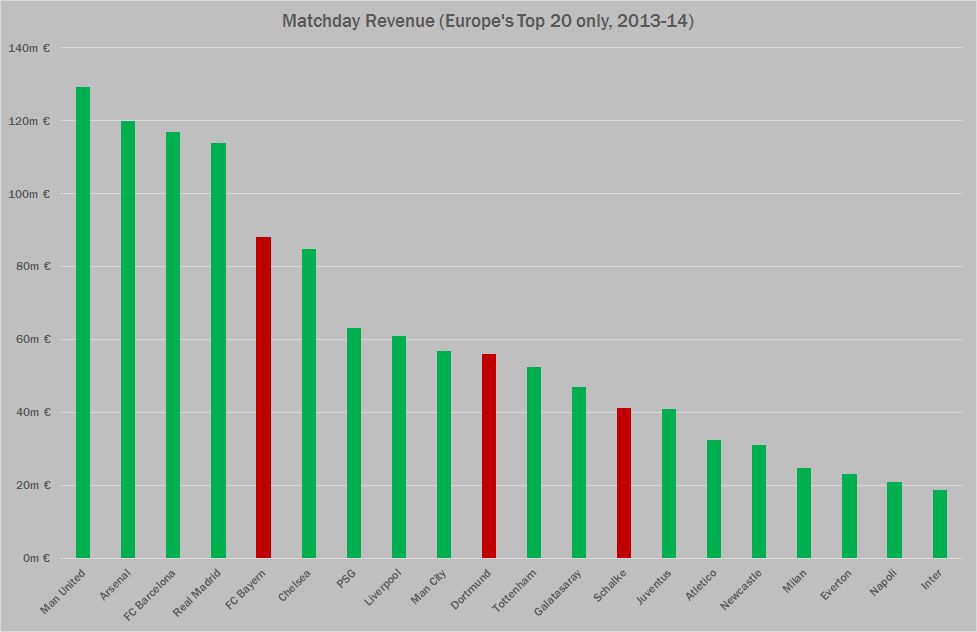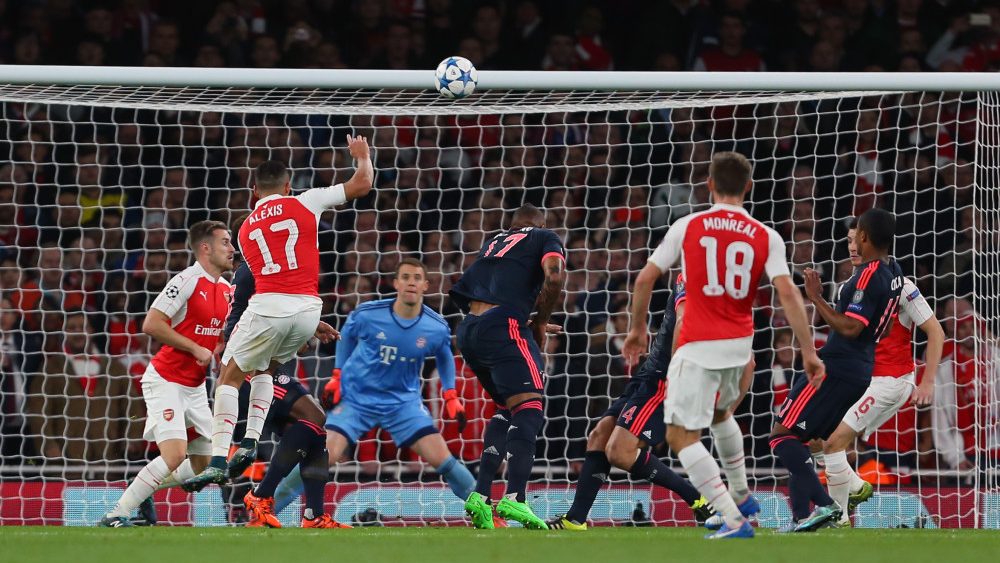State Of The Bundesliga – Part One
The discussions regarding the quality of the Bundesliga have become louder and more frequent recently. We’ve seen, read and heard plenty of arguments, with some blaming the top clubs for boosting their own growth at the cost of the general competitiveness. Bayern are the main target of this criticism, they’re said to destroy the league with financial dominance and their neverending hunger for more money.
Others argue that too many clubs appear to have accepted defeat and a life in mediocrity instead of maximizing and reaching their potential.
In football as well as in most aspects of life, money rules. In order to assess the Bundesliga’s financial situation, we need to look at the internal and external factors. Is the playing field within the league a theoretically equal one or does the money distribution show an extreme bias towards certain teams? And beyond that, is the Bundesliga a competitive league on the European stage, does its head association DFL do enough to guarantee an international attractiveness in order to increase the playing standard?
There are three key sources of income for clubs that are not directly (but very much indirectly) linked to current success and thus good numbers for comparisons.
Matchday revenue
The first one is the matchday revenue. Simply said, it’s how much a club makes by opening its gates and selling tickets. This is a factor that the league can’t influence massively. They can set up incentives or determine standards in order to get clubs to invest in the stadium infrastructure, they can even increase the attractiveness but, in the end, this factor is influenced by many things, several of them on a macroeconomic level.
What’s the area’s infrastructure like? How wealthy are the fans (it would be a lot more realistic to call them customers here), how many of the young people in the area (the target audience) are unemployed? Does the economic situation allow for massive, somewhat questionable investments such as building a new stadium? What type of brand is the club trying to be, what kind of reputation do club and league have? Take all of those and many more questions, turn them into supply and demand, then you eventually come up with explanations of ticket prices and attendance numbers.
That’s the weird, maybe even frustrating thing about matchday revenue. It’s generally strongly influenced by the league you belong to but there isn’t too much the league can do about it, aside from strong marketing. Premier League clubs can charge an extreme amount of money for tickets and get away with it because the demand is so strong that potentially losing some of the poorer fans won’t hurt much. You could say that, in England, they’ve managed to create an audience that might not be as active and loyal but is far more willing to shut up and pay.
In Italy or Spain, this transformation has not yet taken place and due to the different economies and mentalities, it might never happen. Aside from the successful big guns (Madrid, Barcelona, Juventus), it’s close to impossible to maximize matchday revenue. Italy is the prime example of this: In 2013-14, Juventus (84%) were the only team in the entire Serie A that could sell over 70% of available tickets. To compare, the worst-selling club in the Premier League (Burnley) sold 77% of their tickets.
Germany lies in in an odd position in between. The economic and structural factors are a great advantage for German clubs – half of the stadiums in the Bundesliga were built in the 21st century – but there is a loud protest against increased ticket prices. For the average German citizen, visiting a Bundesliga match appears to be seen as a natural right worth being fought for, as the numerous protests and campaigns have shown.
Attendance numbers, both absolute and relative, suggest that the demand for Bundesliga tickets is big enough to cause a price increase. Here are the average attendance numbers for the 2014-15 season:
- Bundesliga – 43,579 (93.1% of tickets sold)
- Premier League – 36,056 (93.9% of tickets sold)
- La Liga – 26,792 (68.8% of tickets sold)
- Ligue 1 – 22,109 (67.6% of tickets sold)
- Serie A – 19,890 (48.3% of tickets sold)
As you can see, German clubs manage to fill their stadiums as well as English clubs do while having bigger capacities. However, they fail to turn this into money, as the Guardian’s analysis of ticket prices in 2013 showed. The average Bundesliga ticket cost only 40% of the most expensive equivalent – the cheapest average BL ticket at 37% of the cheapest average Premier League ticket, the most expensive average BL ticket at 39% of the most expensive La Liga ticket.
Now, all of this raises one big question: would those high attendance numbers be sustainable with internationally average ticket prices? Would people, despite the outcry, still fill the stadiums or have Bundesliga clubs reached a point of optimal pricing and any further raises (except for inflationary adjustments) would cause a mass exodus? The past years in England have shown that you can lose fans – despite loyalty, football eventually turns into a luxury good – you just need a new wave of customers who are willing to pay up. Do those exist in the Bundesliga? That’s a question for real economists.
Full stadium, cheap tickets – this causes the German matchday revenue to be average to decent. For example, Dortmund’s “revenue per seat” is closer to Milan than to Juventus, it’s just that Dortmund sell a lot of them. Here are the numbers for Europe’s 20 richest clubs in 2014, as researched and published by Deloitte:
 Bundesliga teams (marked in red) right in the middle of the pack.
Bundesliga teams (marked in red) right in the middle of the pack.The three German clubs are pretty much average. Bayern are about €25m (or almost one quarter) behind the four giants of stadium money, despite strong attendance numbers (71,008 in 2013-14) and high demand (100% of tickets sold). Dortmund, regularly one of Europe’s leaders in attendance numbers (80,361 in 13-14), make only half as much as the big four and still less than Manchester City or PSG who sold 65% and 63% of the tickets that BVB sold. With higher tickets prices, this is a category that could be very much dominated by German football. What’s stopping them is mostly tradition or a lack of greed.
Within the league, there isn’t much to do to further promote equality. Attending a Bayern or Dortmund home match isn’t more expensive than going to Hannover. Keeping in mind the demand for certain tickets, this almost seems like lunacy. We’ve seen entire tribes go extinct because they were fighting over a ticket for Dortmund’s Südtribüne or Bayern’s Südkurve, yet the ticket itself isn’t worth more than your average seat in Berlin’s Olympiastadion where you get to stretch your legs all you want.
What do sponsors pay? How do Bayern separate themselves from the rest of the league? Find out on page two!












Interesting article. Sounds like Bayern and BVB need to get better negotiators (see NBA/NFL).
Btw, if you want to say the opposite of transparent, you can use the words “opaque” or non-transparent.
Cheers